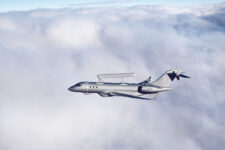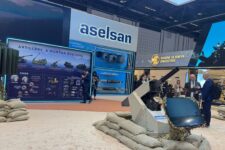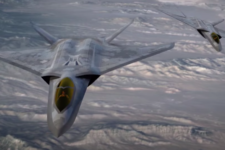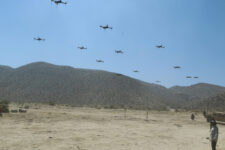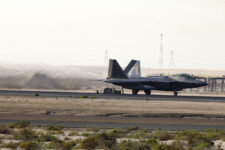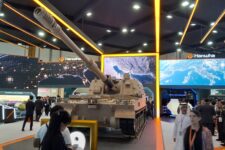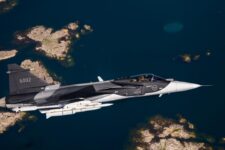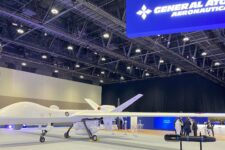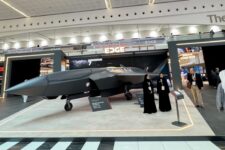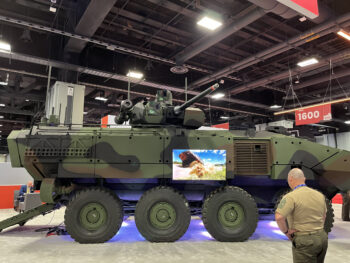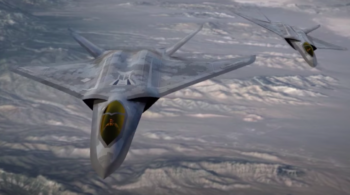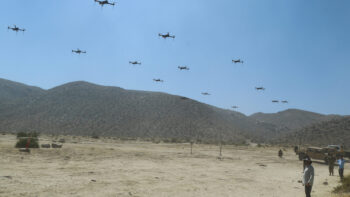
A sign for Anduril at the AFA 2022 Air, Space and Cyber Conference. (Justin Katz/Breaking Defense)
WASHINGTON — Anduril Industries has selected Columbus, Ohio to be home to a new, large-scale weapons production site, as the defense startup seeks to scale its production capacity for autonomous systems like drones.
The facility, dubbed “Arsenal-1,” will start by taking over an existing structure located next to Rickenbacker Airport, Chief Strategy Officer Chris Brose told reporters in a Wednesday briefing ahead of the company’s announcement. In total, Anduril plans to invest $1 billion of internal funds to bring the factory to fruition, including future plans to expand the 700,000 square foot facility to five million square feet.
Taking over an existing footprint means that by July 2026, the site can be up and producing weapons, Brose said.
“Arsenal-1 is going to be an operational facility incredibly quickly because of the timelines we have to deliver for the customers and the warfighters who are counting on the systems that Anduril is producing right now,” he said.
Ohio is offering financial incentives, the state’s Lieutenant Governor, Jon Husted, said during the briefing. According to Husted, the expected 4,000 total staff — the facility will start at around 300 and grow its workforce over roughly a decade’s time — makes it the single largest jobs project measured by employment in the state’s history.
The selection of Columbus gives Anduril the 15-member Ohio delegation as a champion in Congress, as the company seeks to gain a greater foothold at the Pentagon. However, Brose dismissed the idea that politics played a role in the selection, saying “This decision was made on the merits of the state of Ohio, period. Full stop.”
Arsenal will produce the majority of Anduril’s product line, though Brose said the other company’s production sites will not be impacted or moved to Arsenal. A few specific items will likely not end up in Ohio, however: The solid rocket motors the company currently manufactures in Mississippi will not be produced at Arsenal since energetics will need to stay separate, Brose said, and munitions probably wouldn’t be fitted to autonomous systems there either for the same reason.
Through the Arsenal concept, Anduril says it is answering the call of government officials who have said the US needs more capacity for not just high-end items but also lower-cost weapons like the tens of thousands of autonomous systems the company hopes to eventually be capable of producing annually at the the factory.
In a roundtable with reporters on Wednesday, National Security Advisor Jake Sullivan said the incoming Trump administration should sustain US momentum on increasing munitions production and shoring up the defense industrial base, with investments needed for both exquisite weaponry traditionally made by the defense contractors as well as large numbers of simple, attritable systems that can expand magazine depth at low costs.
“What we have seen from the democratization of technology — the Shahed drones, the Houthi missiles — they can rapidly create things that are much simpler than what the United States produces,” Sullivan said.
“They’re not as good, but are certainly good enough to have significant battlefield effect and with particularly secret technologies, getting advances there can be pretty precise,” he continued. “That’s a hard thing to get Congress interested in, or the Pentagon interested in. ‘Hey, why don’t we actually build, in a way, less precisely effective missiles, but a whole lot more of them in addition to the super precise ones?’”
–Valerie Insinna contributed to this report.
Hegseth fires Navy’s top officer, Air Force No. 2
The firings of Adm. Lisa Franchetti and Gen. James Slife follows tonight’s removal of Gen. CQ Brown as chairman of the Joint Chiefs of Staff.



